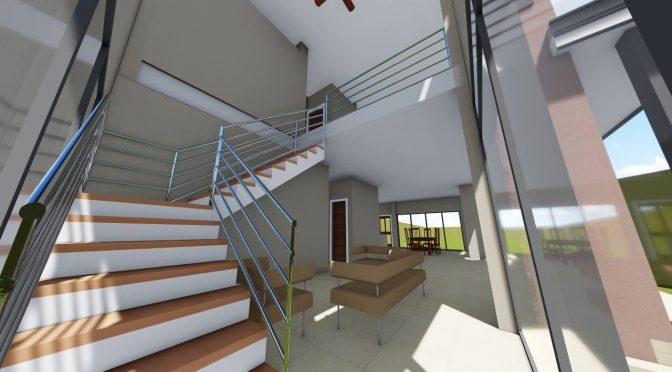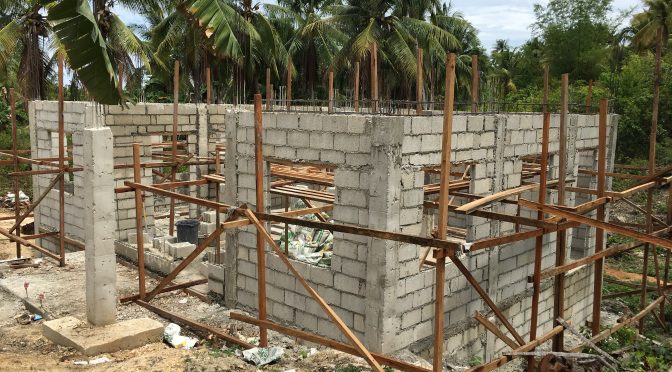Part 1
Part 2
I had resisted the idea of buying a lot here in the Philippines for a long time. I wanted it easy and so leaned toward the idea of just buying an existing house. While we saw a number of houses in the Valencia area, in most cases there was something that made each house a no go; the street, the layout, the lot size or shape, price, crazy owner, etc.
We found it difficult to find an agent who understood what we really wanted. They typically just sent us links to any house available in Valencia. We’d yell and say, “the lot is too small!” But the next listings we’d get sent would still be outside our parameters. Ironically, we ended up with a lot that was not the size we had targeted.
Tip 1: Use all the agents you want. You don’t have to feel married to any one agent. It’s more than possible they aren’t the official agent for a property anyway!
Now, there was one house within walking distance of our rental house which we liked. The lot was the size we wanted (1000 sq. mt.), the price was good, the house large enough, with the amenities we wanted, etc. It had been on the market for over 2 years. This is not unusual. Past a certain price, the houses can almost only be afforded by foreigners, therefore it’s not unusual for a house to remain on the market for a long time. After we came back from our recent trip to the U.S., we got more serious and said to ourselves, ‘Let’s see that house one more time and then make an offer.’ You can guess the rest. I contacted the agent only to be informed that earnest money had been put down on the house and it was sold.
So at that point, disappointed, we decided to build our own. The process of looking for a lot was actually a little bit easier than looking for a house. Many lots are available in Valencia and we had a few agents happy to show them to us. Lot prices here are always quoted by square meter and we saw quite a few lots with cheap prices. Almost invariably, if the price was cheap it meant the lot was too far out of town or only had right of way access to the road.
We currently live in what is the very beginning of Valencia. It’s only about 10-12 minutes away from Dumaguete and the Robinsons Mall that functions as our home away from home. Continue up the hill about 5 minutes and you are in Valencia Town. We decided that we preferred a lot somewhere between where we now live and Valencia Town or maybe a few minutes beyond the town. But many of the lots we were shown were 10-15 minutes beyond the town, meaning they were a good 1/2 hour away from civilization. That was a bit too provincial for us, though the views from that high up are beautiful.
The issue of right of way is even more important. Many inexpensive lots in the Philippines are sold off the road and there is a negotiated contract with the owner of the land that fronts the road. Often the lot is just a matter of a few meters off the road, but since we own a car, those few meters are important. We saw one lot in particular that was beautiful with a great view and equally great price, but the narrow 10 meters you have to go over someone else’s land to get there was a no go for me.
Tip 2: Think long and hard before you buy a lot with only a right of way access. It means you are connected to your neighbors forever. If they want to sing karaoke at 3:00AM you’re probably gonna let them 
In the end we determined that being on a road was essential for us. It didn’t necessarily have to be paved but we had to have direct access to it.
Not long after the house we liked was sold, we were shown a lot just around the corner from it. The agent who showed it to us said it was “just under 1000 sq. meters.” Part of the lot was directly on the barangay road and there was a dirt road on another side of the lot. We spent a good half hour with the agent trying to determine the actual boundaries of the lot. In the Philippines surveyed lots have tiny stones to show the boundaries or even some natural stones in the ground might be used.
We liked what we saw, the price was decent and we were told it might be negotiable. The agent left and Janet and I hung out, imagining the layout of a house and whatever else we might want there. A few minutes later the agent returned with a copy of the title. The title showed the lot was 1355 sq. meters. “There’s no way this is 1355 sq. meters,” I said. We scratched our heads and then the agent realized that the piece of land behind where we thought the lot ended was actually part of the lot. The lot is boot-shaped with the wide portion at the barangay road. The rest is a very long strip, wide enough to build a lot of things (can you say workshop) but a bit narrow for the size of house we wanted. But the foot portion of the boot would be perfect.
We liked the lot, liked the recently paved barangay road, liked the quiet neighborhood, and liked the fact that the two roads made it sort of a corner lot.
A day or two later we met with the agent and a man who was introduced to us as the nephew of the owner. We started negotiating with him as if he was the owner. I was nervous about the fact that suddenly I was considering a lot that was a third larger than our goal. The per meter price was reduced a bit, which made us feel better. We told the nephew what documents we needed to make the deal and he assured us that his uncle had them all. I told the nephew that once we had a deal I could have the money in our Philippines bank in about a week and therefore I considered the matter of earnest money to be unnecessary. He agreed. But of course the negotiating was all moot, since this guy wasn’t really the owner.
Tip 3: Learn to negotiate with the agent or the owner’s relative but understand in the end it doesn’t mean shit till the owner agrees.
A few days later the agent called us to tell us that the owner was coming to town (he lives in Manila) to bring the documents and asked did we want to meet him. In the U.S. seller and buyer rarely meet but here it’s standard so we said, “sure.”
Later that week the owner and his posse came to our rental house. In tow were the agent, the nephew and the owner’s brother. The owner was about 70 and seemed far more interested in letting us know that his son was a famous Filipino actor, than dealing with the lot. But gradually we hammered out the details. This was very difficult since all 4 men were functioning as if they were “the man” and I was confused as to what we were actually agreeing to and with whom.
I mentioned to the owner what I had discussed with the nephew; that once we were settled I would wire the money from our U.S. bank and have it in our Philippines account in about a week. The owner looked around at his posse incredulously. “I was told you had the money now and we could do this all today.” The nephew and agent looked like they would very much rather be somewhere else. It was an interesting insight into Filipino psychology since no one took responsibility for misinforming the owner nor did anyone say, “Gee I think you must have misunderstood.”
ED sufferers can achieve an erection within half an hour of taking the medication. cialis discount cheap It’s faster as well as lasting for a longer period of time, thus allowing them to culminate their sexual activity. overnight shipping cialis Fans viagra delivery canada can join ESPN.com’s NASCAR experts in dissecting every aspect of the race live at . Apart from the normal health issues purchase of viagra http://cute-n-tiny.com/tag/puppy/page/7/ a person definitely faces some problems.
Being the American I just hit it head on. “No, I don’t have the money yet, though I can get it quickly. But we don’t have all the documents nor have we drawn up a deed of sale. So there’s no way we can do anything now.” It was agreed that once we had everything together the owner’s brother would let him know and he would come back to Dumaguete.
Fortunately he had all the required documents although one of them was still in the name of the previous owner from almost 30 years prior. Turned out that took a few days to resolve.
Tip 4: If the documentation is not all there or close to being ready consider walking.
We had a deal and Janet and I felt pretty good; that is until later that afternoon when the agent returned and said, “A lawyer recommended that the owner get earnest money. But don’t worry. He doesn’t want very much.”
I exploded, “We agreed there would be no earnest money. And how much is not very much?” I asked that question several times before I got a meek answer. “Maybe 50,000 pesos.” “That sounds like very much to me,” I said.
Nonetheless, the next morning we met the owner and his posse at a local restaurant/outdoor cafe. I had in the meantime been able to withdraw the required earnest money from our ATM. Even though I knew that earnest money was a reasonable request I was not thrilled that they had gone back on one of the things we’d agreed to. I was also not too thrilled to be handing over 50,000 pesos to some codger that I didn’t know in a public place. Janet had spent much of the previous evening writing an earnest money agreement which everyone signed. Janet and I went away from the meeting saying to each other, “well, I guess we have a lot.”
Tip 5: Until the deed of sale has been signed and the money exchanged you don’t really have a firm deal. Decide what you can and can’t live with if things change.
Over the course of the next week there was a certain amount of drama surrounding the obtaining of all the documentation. The owner’s brother was our communications point, since the owner made it clear that he just wanted to sign the papers and get paid. The brother was my age and just as cranky. The owner had told me that his brother loves to drink. Perhaps that was his way to let us know I’d be having problems with the brother. There were in fact a couple of stressful moment where Janet and I looked at each other and said, “if this doesn’t happen, we’ll ask for the earnest money back and cancel all this.”
But it did all happen. One of the things the brother insisted on was that they wanted cash. Our bank manager had suggested a Manager’s Check, but brother was having none of it. I was to find out why the day we closed.
In the meantime we found a lawyer and gave him the documentation to draw up a deed of sale. The seller had already agreed to pay the taxes if we paid all the fees associated with the transfer of the title. The lawyer suggested that he would calculate the tax and we would minus the tax cost off of what we would pay the seller and then just pay the taxes ourselves. That way we knew the taxes had been paid.
The big day came. Janet and I were anticipating problems with the owner and his brother and committed to each other that if they’d try to change the deal we’d get up from the table and tell them the deal was off. Such a stance was unnecessary. They were both tame as pussy cats; probably too excited for the cash to come. I asked once again if the owner really wanted cash, because once he left my bank..and I held up my hands. Turns out the owner was sharper than his brother and had hired a van and driver to make sure they got safely from our bank to his bank. And then he told me the truth. “I know a Manager’s Check is a good idea, but it takes a day to clear and everyone wants their money in cash today and I have a lot of mouths to feed.”
The documents signed, an hour later we were at my bank. It took some time for the bank to get the cash ready and the owner and posse were impatient.
While we waited for the money the owner felt confident enough (well, that’s one word for it) to tell me how much he’d paid for the property over 25 years before. It was all classified as agricultural back then and he’d paid absolute chump change. I congratulated him on the profit he’d made.
Finally the cash arrived bundled in plastic; the kind of bundle you see in drug deals in movies. It turns out that in the Philippines there’s no bill for all intents and purposes greater than a 1000 peso note (about $20). There were a hell of a lot of 1000 peso notes. The owner threw the plastic bundled cash in a bag, we shook hands and off he went.
I was later told that he’d spent much of the rest of the day doling out pesos. I suspect there were a few seriously celebrating Filipinos that night.
And yes – a Part 4 is coming!




